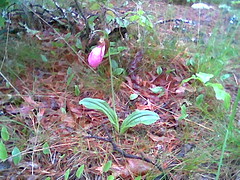I'm on my way up to Boston in a little while to lead a workshop on Getting the Word Out for artists at a conference organized by my friend Kathy Bitetti, executive...
passing notes and twittering behind your back
I'm in the final two weeks of presenting What's Your Story: Personal Branding, PR and New Media for Artists -- an eight-week class for artists who are just getting started in online promotions and sales -- and today I spent some time firming up a few technical details with my next speaker, Len Edgerly, podcaster and videocaster extraordinaire.
We sort of jokingly raised the question of how we would handle the Twitter back-channel, if there was one, during his session -- jokingly because this class is only just getting wet in social media, and only a few of them are on Twitter at all, and certainly not, to my knowledge, at the level of saturation that we are (for better or worse).
I think our laughter was somewhat nervous laughter, because we live-Twitter events constantly, and it's bound to be our turn to be live-Twittered ourselves one day.
In any case, what would I do if I were moderating a panel, or presenting a class (which I do often), and the Twitter channel lit up?
As David Berkowitz wrote the other day, "... At a minimum, a speaker or mod(erator) should monitor the back channel, but keep the focus on those on stage."
Monitoring the back channel, if it exists, is just as important as taking the emotional temperature of the room -- both as a speaker and a moderator -- and adjusting accordingly. Watching faces, listening to restless rustles, checking for questions or contributions -- and watching what notes people are passing to each other -- are all parts of being a good and attentive host.
I know I'll be monitoring twitter at the concerts and public events coming up on my organization's calendar, probably using Summize or Tweetscan.
Not just to listen in on what people have to say, but to meet the folks in my community who are using Twitter to communicate and navigate the world. If they are at my event, and Twittering, they are people that I want to know!
I'm interested to see how the use of Twitter evolves at large cultural events, like concerts and festivals. More people are discovering Twitter every day, and events like these lend themselves very well to communicating --both peer-to-peer and management-to-crowd, via cell phone.
I've seen people try to introduce Twitter to groups at events, which doesn't really work. There are people who Twitter, and some of them might be at your event. Watch them. Figure out how to interact best with them -- what works for them -- while there are still only a few. Their numbers will grow, and when they do, we'll know how to deal with them.
How do you use Twitter at your own events? How might you, if you did?
.png?width=500&height=500&name=bd%20(3).png)
